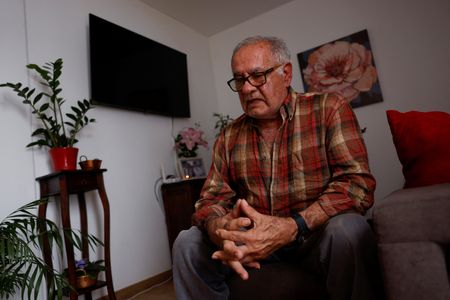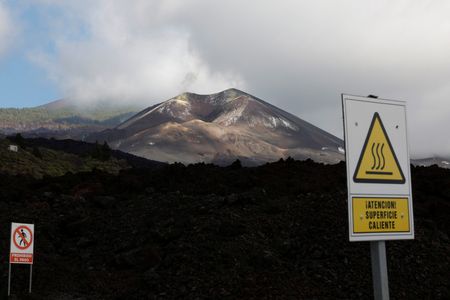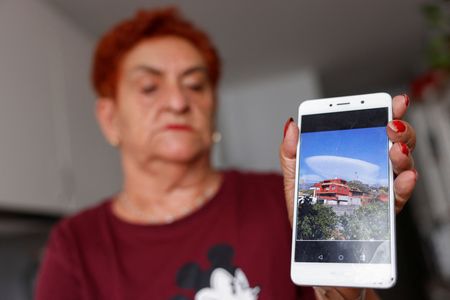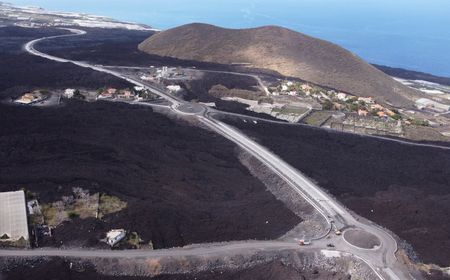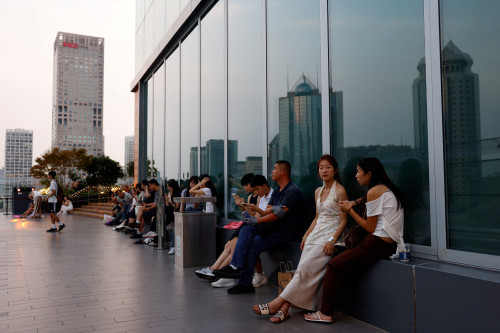By Borja Suarez
LA PALMA, Spain (Reuters) – Living in rows of look-alike makeshift homes as hardened black lava covers the once-bucolic valleys where they used to dwell, many residents of the Spanish island of La Palma feel resentment and yearn for political change in this month’s general election.
The eruption of the Cumbre Vieja volcano over three months in late 2021 devastated the southern portion of the island, part of the Canaries archipelago in the Atlantic, forcing the evacuation of thousands of people and destroying about 3,000 buildings, and hundreds of plantations.
Karin Bansberg, 57 and a Dutch national, has been living in La Palma for 31 years. Inside her tiny wooden home provided by the government, she sobbed as she remembered her 15,000-square metre (3.71-acre) plot of land where she had a house, stables and gave horse-riding lessons.
“And I have nothing… There are days when I fall apart,” she told Reuters.
“(Prime Minister Pedro) Sanchez has not done many good things and much less here. Lots of visits and photo ops, and he has done very little. I think we need change,” she added, complaining that a 100,000-euro ($110,210) subsidy she received to buy a new plot will not make up for what she lost.
Sanchez, in power since 2018, called the snap election in May after his leftist coalition was routed in regional and municipal ballots, including the Canary Islands.
Opinion polls show his coalition lagging behind the combined right for the July 23 national ballot.
The government has pledged more than 550 million euros for reconstruction, but most residents and businesses see that as too little, considering La Palma Island Council estimated damage at around 1 billion. They complain of delays in getting aid.
The prior Socialist regional administration has denied criticism of insufficient aid and delays.
“Surely one could do better, but with other governments it would have been worse,” former regional leader Angel Torres said earlier this year as Sanchez was visiting the island.
“We lost a lot… our way of life, the livelihood,” said Jaime Morcillo, 74, fighting back tears. He and his wife lost their home and banana plantation and now live in a container home. Their five children also lost their homes.
“I am thankful, but to stick us into a container and that’s it… It can’t be,” Morcillo said, lamenting also that the container settlement was in a remote area without any social venues.
Retired businessman and volcano evacuee Luis Galo said the ousting of the Socialists in May’s regional election was more than deserved: “You can’t say you will do what you won’t do… Now we have another election coming up and I think it will reflect this change.”
Not all share the same view as some fear the ascension into government of the far-right party Vox alongside the centre-right frontrunners, Spain’s mainstream People’s Party.
“No, no, no, before the PP and Vox, I want freedom,” said Maria del Carmen Gonzalez, 45, a Socialist voter who also lost her land to the volcano. “I don’t want what those people believe in.”
A common hope for the election is that local politicians from the Canaries Coalition Party, who now rule the region in a tie-up with the PP, get parliamentary seats in Madrid.
“That’s really important, because if not we will be forgotten… Although they say it’s Spain, they are forgetting us,” said Bansberg, who voted in the regional election, but, as a Dutch citizen, cannot vote in the general one.
($1 = 0.9074 euros)
(Writing by Andrei Khalip; Editing by Sharon Singleton)


